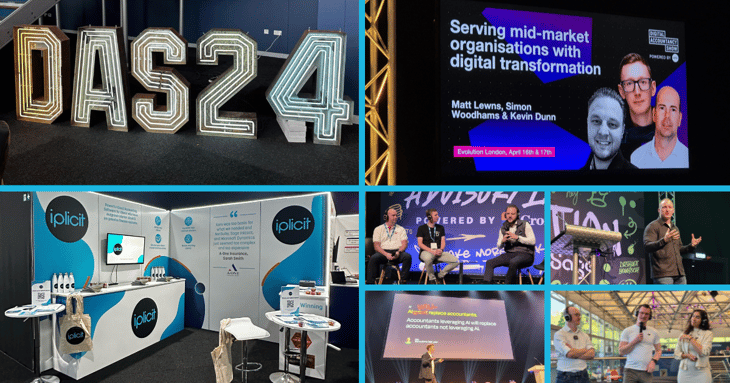There has never been more interest in what the future of finance and accountancy could look like – or more uncertainty about it.
The Digital Accountancy Show, or #DAS24, brought accountants in practice together with in-house finance professionals at Evolution London in Battersea Park. The event consisted of an exhibition plus talks and discussions.
Nobody will expect a prize for guessing that artificial intelligence would be on the agenda. But there were other big developments involving technology and finance that provoked plenty of discussion too.
iplicit was there to report on a few of the key themes from Day 1 of the show.

1. The CFO’s role is changing. Maybe it should be called Chief Value Officer
Michael Mills is Director of Finance Operations at Jaguar Land Rover – but that role is not just about the traditional financials.
JLR may have traditionally been a favourite brand for petrol heads but it is on a decarbonisation journey, with aspirations to reach carbon net zero by 2039. Michael was at #DAS24 to talk about sustainability initiatives and the role of the CFO.
He said one in five candidates were turning down job offers if they did not believe their prospective employers valued sustainability.
“The CFO role is changing. It’s less about financials and a lot more about value,” he said.
“Our finance mission is to protect value and grow value. If sustainability is perceived as value, it’s our responsibility to protect sustainability and grow it,” he said.
He suggested a new job title: Chief Value Officer.
And he had three pieces of advice for others embarking on a sustainability journey: start now. Start small. And be bold.
“This is about leaving a better future, so this is a space where I’d ask you to be bold, be brave, and we’ll collectively do better,” he said.
2. Maybe we should stop talking about whether AI will replace accountants
US speaker Jason Staats – who hosts the Jason Daily podcast for accountants and runs the online community Realize – was among those tackling the question of whether AI would lay waste to jobs.
His talk was called My Name’s Jason and I Got Replaced by AI. And when he came to that topic, his words were interrupted by a crack-of-doom thunderclap from the heavens above Battersea.
He said that for as long as he had been an accountant, people had been speculating that the job could be done by a computer.
“For some reason, accountants are always ripe for displacement,” he said.
He said many people would read headlines asking whether AI would replace accountants, but nine out of 10 would not read the accompanying articles and their nuances.
He added: “The biggest fallout from this is going to be the talent pipeline. It’s going to be the 17-year-old who’s scrolling his news feed and sees ‘Can ChatGPT do a tax return?’”
Last year, Jason said “AI won’t replace accountants” but “accountants leveraging AI will replace accountants not leveraging AI”. Rapid advances in AI since then had led him to reconsider his position.
“Being an accountant is a collection, for most of us, of a fairly diverse set of tasks,” he said. AI “absolutely will replace work that we’re doing” and will become “the personal assistant of your dreams”.
But its potential for replacing accountants in their entirety is less clear – and he urged people to stop discussing the issue so simplistically.
“Let’s just take this a day at a time and figure it out on the fly,” he said.
3. There’s more appetite than ever for people to upgrade their software
Not since the Covid lockdowns has there been so much keenness to leave behind old on-premises finance software and embrace cloud technology, a #DAS24 audience heard.  A session called Serving Mid-Market Organisations With Digital Transformation featured iplicit’s Partner Manager, Matt Lewns; Simon Woodhams, Software Advisory Manager with Moore Kingston Smith; and Kevin Dunn, Solutions Director at Finzo and Macalvins Group.
A session called Serving Mid-Market Organisations With Digital Transformation featured iplicit’s Partner Manager, Matt Lewns; Simon Woodhams, Software Advisory Manager with Moore Kingston Smith; and Kevin Dunn, Solutions Director at Finzo and Macalvins Group.
Matt told how iplicit had been invented to fill the gap between entry-level software and products that were “too complex or too expensive”.
Simon discussed the process for reviewing a client’s software needs and advising them on a digital transformation. Most leads were businesses who were using legacy on-premises systems and were keen to move to the cloud, he said.
“I think there’s more appetite than there’s ever been. At the start of Covid, everyone wanted to be cloud-based. Then there was a lull and the start of this year has been our busiest software year ever,” he said.
“It’s come back around that people want to be in the cloud, with hybrid working becoming more acceptable.”
For accountants, embracing a product like iplicit – designed for medium-sized organisations – meant being able to continue serving those clients as they grew, rather than seeing the client bring operations in-house.
Kevin said many growing organisations needed to leave behind entry-level cloud accounting software which was being strained to its limits.
Some clients were putting 500,000 records into “small-tier” software and having to find workarounds to run reports, he said.
He also warned of the dangers of plugging too many applications into an entry-level finance system rather than moving to more powerful core software. “There are some great apps here today,” he acknowledged, but it was often preferable to be able to “do it all in one solution”.
4. You need to do due diligence on your software vendor
Moving to the cloud should drastically improve the running of a business – but everybody affected needs to be involved.
That was among the messages at a session called Data Migration: Navigating the Move to Cloud Accounts and Tax Production, with Dan Faulkner of Wolters Kluwer Tax & Accounting UK and Crawford Millar of William Duncan.
“Everyone needs to be on board for the journey,” said Crawford.
He urged businesses to research the market thoroughly to make sure cloud technology would improve their efficiency without losing any functionality they had already.
Decision makers might also want to consider whether the vendor needs to be in the same time zone as their organisation, he said – rather than finding themselves creating helpdesk tickets which would only be answered when they were asleep.
He said it was important to have a good relationship with your software vendor.
“You definitely need them involved in the implementation process to make sure you’re not missing anything,” he said.
“You need them on board post-going live in case of teething problems. It becomes a partnership between the practice and the vendor.”
He urged: “Test the system. Keep testing and testing and then test some more. You can never do enough testing.”
5. There will be certificates in digital transformation
“There are lots of businesses selling that ‘We can do this, we can do digital transformation, system advisory, but they may not be doing it with any great ability or confidence,” argued Ryan Pearcy, Associate Partner at Scrutton Bland.
Ryan hosts the podcast Digi-Tools in Accrual World alongside John Toon, Tech Strategy Lead of Beever and Struthers. They were joined by Indi Tatla, Chief Revenue Officer at Bankable and producer of the podcast, to reveal plans for a certification in digital transformation. Those seeking the certificate would answer multiple questions and provide case studies, with two opportunities each year to take the test.
“We want to hold each other to account. We want to improve the quality of the service we’re providing and make sure our clients are getting the comfort that those they engage with can provide a high-level service,” Ryan added.
John Toon said: “We’re looking to test not just knowledge but aptitude and experience and how we do that implementation in terms of its structure.”
Indi revealed that the team were joining with AppAdvisory Plus for the initiative, with the aim of launching it in the fourth quarter of this year.
6. Businesses need to challenge their staff if they want them to stay
iplicit held “knowledge share” sessions to discuss how accountancy practices could retain and serve their mid-market clients.
Luke Quince, Head of Digital Delivery Services at Azets, performs system reviews which look at clients’ processes and needs before recommending any software.
He said integrating more than four other apps with a finance system was a “red flag” which could indicate it would be better to change the finance system.
He also argued that working with mid-market organisations could be important to attracting and retaining staff.
“We’ve got to challenge our good staff, to retain them,” he said. “If not they’ll go somewhere else.”
Find out more about iplicit
If you didn’t meet iplicit at the Digital Accountancy Show, you can still find out about its finance software for medium-sized organisations and for the accountants seeking to better serve them. Take a tour of the software or get in touch for for more information.
Want to know what else the future might hold for finance teams and accountants? iplicit's guide Change Is Coming: 7 Key Trends in Finance Software You Need to Know About contains insights from 12 leading professionals on everything from AI to e-invoicing. You can download a copy for free.


![[GUIDE] 2024 Trends - Featured Image](https://www.iplicit.com/hs-fs/hubfs/%5BGUIDE%5D%202024%20Trends%20-%20Featured%20Image.png?width=1200&height=628&name=%5BGUIDE%5D%202024%20Trends%20-%20Featured%20Image.png)